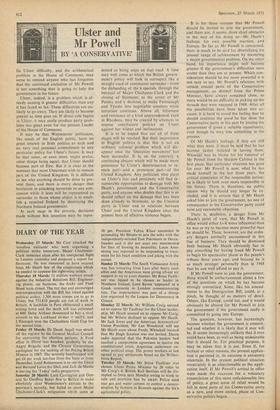DIARY OF THE YEAR •
Wednesday 17 March: Mr Carr attacked the 'mindless militants' who were organising a political strike tomorrow. Major Chichester- Clark remained silent alter his unexpected flight to London yesterday and prepared a report for Stormont. He was rumoured to have secured from Mr Heath few of the concessions which he needed to appease his right-wing critics.
Thursday 18 March: II million workers struck against the Industrial Relations Bill. Engineer- ing plants, car factories, the docks and Fleet Street were closed. The TUC met and encouraged non-cooperation with the Bill but voted against political strikes. 1,300 more troops are to go to Ulster, but 753,810 people are out of work in Britain. A landslide in Peru obliterated a small mining town and the death toll was estimated at 600. Delta Airlines threatened to buy a rival
aircraft to the Lockheed tri-star aa211, and L'Escargot won the Cheltenham Gold Cup for the second time.
Friday 19 March: Dr Derek Segall was struck off the register by the General Medical Council for canvassing for abortion patients. A Ford office in Ilford was bombed, probably by the Angry Brigade, and the Chinese Government apologised for the sacking of the Peking British Mission in 1967. The severely handicapped will get £4 per week tax-free from the State as from December. Lord Rothennere is to sue the Times and Bernard Levin for libel, and Jack de Manio is leaving the 'Today' radio programme.
Saturday 20 March: Lord Carrington and Gen- eral Sir Geoffrey Baker flew to Belfast to make absolutely clear Westminster's attitude to the province's security, but failed to avert Major Chichester-Clark's resignation which came at 10 pm. President Yahya Khan succeeded in persuading Mr Bhutto to join the talks with the independently-minded East Pakistanis in Dacca. Sweden said it did not want EEC membership for fear of loosing its neutrality. Louis Arm- strong was reported to be responding to treat- ment for his heart condition and joking with the nurses.
Sunday 21 March: The South Vietnamese Army was fast retreating from Laos after heavy casu- alties and the Americans were giving all-out air support to try to avert disaster. Mr Brian Faulk- ner was tipped to be chosen as leader in Northern Ireland. Lord Byron 'appeared' at a Greek ceremony in London commemorating him. The impersonator was part of a disrup- tion organised by the League for Democracy in Greece.
Monday 22 March: Mr William Craig seemed set to oppose Mr Faulkner for the Ulster leader- ship, Mr Heath seemed set to oppose Mr Craig, but Mr Wilson declined to oppok Mr Heath. Mr Jack Jones and the American Autoworkers' Union President, Mr Len Woodcock will see Mr Heath soon about Fords. Whitehall insisted that Mr Hugh Scanlon was not invited. Dacca radio reported that the Pakistan leaders had reached a compromise agreement to resolve the constitutional crisis; Argentina underwent an- other political coup. The power workers at last agreed to pay settlements based on the Wilber- force Report.
Tuesday 23 March: Mr Brian Faulkner was chosen Ulster Prime Minister by 26 votes to Mr Craig's 4. British Rail Services will be dis- rupted as from next Monday owing to work to rule and overtime ban by ASLEF. Police used tear gas and water cannon to control a demon- stration by farmers in Brussels against the Six's agricultural policy.










































 Previous page
Previous page